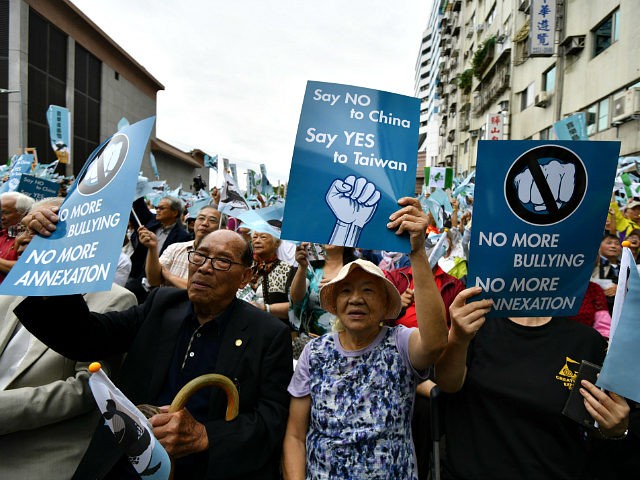A Chinese government official said Wednesday that Taiwan is circling an “abyss of danger” by discussing independence because Beijing will not “sit by and let it loose.”
The latest Chinese warning came in response to comments from independence advocate Koo Kwang-ming, who spoke last week at the inauguration of his Taiwan New Constitution Foundation. As the name implies, the organization is dedicated to writing a new Taiwanese constitution that Beijing would like even less than it likes the current one.
The Taipei Times summarized Koo’s remarks last Thursday:
The idea of drafting a new constitution tailored for Taiwan has been publicly discussed for more than a decade, Koo said.
Taiwan’s relationship with China and other countries is unstable, but at the US’ behest, presidents have been compelled to maintain the “status quo,” which has limited the nation’s participation in the international community, he said.
Taiwan is qualified to join the UN, but is prevented from doing so by the “status quo,” and only had to leave the international organization because Chiang Kai-shek refused to participate alongside Beijing, he added.
Nevertheless, Taiwan has made outstanding achievements and contributions worldwide, Koo said, adding that a new constitution should be drafted so that the nation can formally participate in international organizations.
“China’s actions toward Taiwan are increasingly unreasonable and without consensus, which is causing change in Taiwanese society,” he said, adding that the Democratic Progressive Party’s (DPP) losses in the nine-in-one elections on Nov. 24 last year were due to its failure to address public dissatisfaction with the “status quo.”
Koo argued that Taiwan must act more aggressively to secure its independence because allies such as Japan and the United States are interested in preserving the “status quo” to maintain relations with Beijing. He felt Taiwan has evolved far beyond the limited independence envisioned by the original constitution and its 1996 amendments.
Chinese media simultaneously portrayed 93-year-old Koo as an elderly crank no one takes seriously and a dangerous threat to regional stability, as in China Daily’s editorial about the Taiwan New Constitution Foundation:
Koo, who is now 93, can hardly make a difference, good or bad, regarding the status of Taiwan. No matter how hard he tries.
Equally obviously, though, the ambitious Lai Ching-te thinks he can. The former head of the “executive yuan”, who stepped down on Jan 11 as a result of the DPP’s Nov 24 failure, endorsed Koo’s aspiration for a new “constitution”.
Present leader Tsai Ing-wen’s obsession with the “status quo” of relations across the Taiwan Straits has limited Taiwan’s participation in the international community, Lai said. To change that, the island needs a new “constitution”.
With that, Taiwan will be able to solve the issue of being an “unrecognized nation”. In his words, Taiwan would have stayed within the United Nations had then leader Chiang Kai-shek not refused to participate alongside Beijing. Completely ignoring the historical truth that the UN members recognized Beijing as the sole, official representative of China.
Accordingly, he attributed the DPP’s latest defeat to Tsai’s disloyalty to the party’s fundamental goal of independence, and the party’s failure to translate corresponding advocacy and opinions into “the next step”.
While Lai labels himself as a “pragmatic worker” for “jurisprudential independence”, many believe in so doing he is just wooing support from the “deep green” faction for his potential bid for local leadership in the 2020 elections. Once he fills Tsai’s shoes, observers say, he too, like all DPP predecessors, will hover around the “status quo”.
With China’s strategic national reserve of sneer quotes running low, the mainland State Council Taiwan Affairs Office turned to serious threats on Wednesday, as related by the state-run Xinhua news service:
Ma Xiaoguang, spokesperson with the State Council Taiwan Affairs Office, made the remarks in response to a question about a Taiwan politician who claimed that time is ripe for a “new constitution” that advocates “Taiwan independence”.
While commenting on the new leader of Taiwan’s Democratic Progressive Party (DPP) expressing support for “Taiwan independence” activities, Ma said such statements revealed that the DPP was the “destructor of cross-Strait relations” and “a troublemaker undermining peace and stability across the Taiwan Strait.”
Ma criticized the DPP authority, saying it acted in defiance of the strong public will in Taiwan to develop cross-Strait ties and improve the economy and the people’s livelihoods, and had been continuously building up cross-Strait tensions and restricting cross-Strait exchanges.
“This further exposed the DPP’s nature as it is turning against the interests of the public in Taiwan,” Ma said.
The spokesperson said the mainland will continue to unite Taiwan compatriots, eliminate interference, expand and deepen cross-Strait economic exchange and cooperation, to promote the welfare of Taiwan people and forge closer bonds among compatriots on the two sides.
Brent Christensen, the de facto U.S. ambassador to Taiwan, said on Wednesday the United States is concerned about China’s movement toward forced reunification, possibly of the type that involves bombing runs and amphibious landings.
“We certainly urge China to abstain from any coercion that would jeopardize the security or the social, economic system of the people of Taiwan,” Christensen said, noting that Taiwan has clearly rejected the idea of reunification proposed by Chinese President Xi Jinping.
Taiwanese internet users noticed on Monday that at the same press conference on Venezuela where U.S. National Security Adviser John Bolton caused a stir with his exposed notepad, the map of countries that support Venezuelan dictator Nicolás Maduro hanging in the background pictured Taiwan as separate from China.
“Are the Chinese internet users going to boycott the White House? Will they force the White House to apologize?” one Taiwanese user goaded, mocking the Chinese habit of launching boycotts against foreign companies that do not refer to Taiwan as part of China.

COMMENTS
Please let us know if you're having issues with commenting.